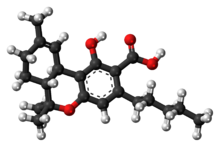Tetrahydrocannabinolic acid
 |
|
 |
|
| Clinical data | |
|---|---|
| ATC code |
|
| Identifiers | |
|
|
| CAS Number | |
| PubChem CID | |
| ChemSpider | |
| ECHA InfoCard | 100.216.805 |
| Chemical and physical data | |
| Formula | C22H30O4 |
| Molar mass | 358.4733 g/mol |
| 3D model (Jmol) | |
|
|
Tetrahydrocannabinolic acid (THCA, Δ9-THCA, 2-COOH-THC; conjugate base tetrahydrocannabinolate) is a biosynthetic precursor of tetrahydrocannabinol (THC), the active component of cannabis. When purified, it forms a crystal which is unstable in the presence of acids, heat, oxygen, and/or light.
THCA is found in variable quantities in fresh, undried cannabis, but is progressively decarboxylated to THC with drying, and especially under intense heating such as when cannabis is smoked or cooked into cannabis edibles.
THCA does not have any known psychoactive effects on humans in its own right. It does have antiinflammatory,neuroprotective,antiemetic (anti-vomitting) and anti-prostate cancer effects. It inhibits COX-1 and COX-2 enzymes involved in inflammation in human colon cell cultures. It has also been shown to decrease the amount of oxidative stress caused by impairment of which is a major mechanism in neural degeneration in mouse mesencephalic cell cultures.
Despite the ready decarboxylation by drying or heating ex vivo, conversion of THCA to THC in vivo appears to be very limited, giving it only very slight efficacy as a prodrug for THC. Consequently, it is believed to be important in less-psychoactive preparations of cannabis used for medical use, such as cannabis tea.
...
Wikipedia
